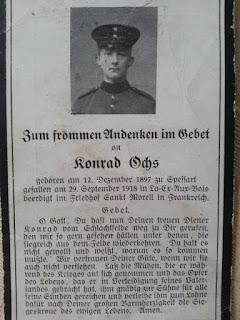This week our story is taken from the original newspapers and field letters of 1916 held in Ettlingen's Town Archives (Stadtarchiv Ettlingen) and observes the fates of three different men during one week in June 1916. Coincidentally, all three were either stationed in or on their way to Russia.
Lord Horatio Herbert Kitchener
On Wednesday 7 June, 1916, Ettlingen's local newspaper the Badischer Landsmann reports on the death of the English Minister of War Lord Kitchener, following an announcement by the Admiralty in London.
Field Marshal Horatio Herbert Kitchener, 1st Earl Kitchener, had become Secretary of State for War at the outbreak of war in 1914. Kitchener had already won recognition for his roles in Egypt, Sudan, Khartoum, the Anglo-Boer War and India. One of the few to realize that the war would be a long one, he played a key part in organizing an enormous volunteer army as well as expanding the production of war materials. Kitchener drowned on June 5, 1916 when the HMS Hampshire was sunk west of the Orkney Islands, Scotland. He had been on his way to Russia to attend negotiations. It was reported that the HMS Hampshire struck a German mine, although various conspiracy theories concerning his death have since been put forward.
The English Minister Of War Lord Kitchener Sinks With His Staff
"WBT, London, June 6. According to official information from the Admiralty:
The Commander-in-Chief of the Great Navy announces:
To his deepest regret, he must report that the warship "Hampshire", which was on its way to Russia with Lord Kitchener and his staff on board, was sunk last night west of the Orkney Islands by a mine or possibly a torpedo. The night was extremely stormy and although all possible measures were undertaken to provide rapid assistance, it is feared that there is little hope that anybody will have survived.
(Note: Hampshire is an 11,000-ton armored cruiser launched in 1903. It had a speed of 23.2 knots. It held 39 guns and normally had a crew of 660 men on board)."
Dr. Theodor Kiefer
Four days later on June 10, 1916, young German field doctor Dr. Theodor ("Tor") Kiefer, stationed at the Eastern Front in Russia, writes to his family in Ettlingen. For the last few weeks, Tor has been acting batallion's doctor while his superior is on leave. Apart from his medical duties, Tor spends every spare moment, "with pathological zeal", as he reports, organizing the conversion of dugouts into infirmaries. It is clear from Tor's letters during this time that he is under tremendous stress, and that he values the reading and writing of post to and from his family as a mental relief.
"We are currently in a new position, no longer as pleasant as the last one, but reminiscent of the Western Front. I am presently dealing with the problem of a trench stretcher for transporting wounded in the narrow, high trenches. If the Russians attack us here they'll bash their heads in. Our people have been feverishly expanding here for weeks and apart from the fact that a position is never finished, everyone is still continuing at the same pace. I have absolutely no chance of leave at the moment. And I have no hope of it for at least two months. I do not dwell long in my thoughts on Ettlingen, but I would still be grateful for letters full of your news. The mind is easily distracted and wanders through the peaceful realms of a past long since past, and although it is dangerous to think too much, such memories are scarcely tantalizing.
It is terribly difficult to write here, the telephone rings constantly, batmen and dispatchers arrive. One can barely write one word without being distracted by something. Everything in a small room under the earth, made of raw firtree trunks, containing 3 pallets [makeshift beds] and the table."
Leutnant Felix Kiefer
On June 11, 1916 Tor's younger brother Leutnant Felix Kiefer is about to return to the Front for the third time. Felix was wounded on several occasions and after various long stays in the lazaret was always sent back to the Front, until he was finally released from military service in the spring of 1918. Felix married his sweetheart Erne during the war and they corresponded on an almost daily basis. In this postcard sent from the lazaret shortly after his release, he tells her that he has spent a boring evening in Aschaffenburg but is to commence travel to the (Eastern) Front in Russia the next day.
 |
| Felix's Postcard to Erne, June 11, 1916 |
 |
| The front of the postcard. The caption reads "Young Germany" |





















